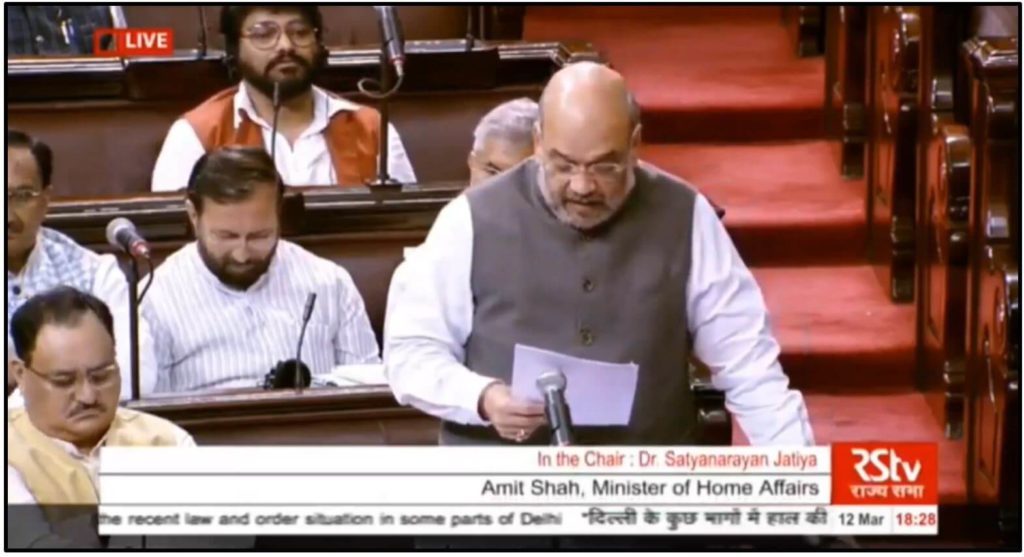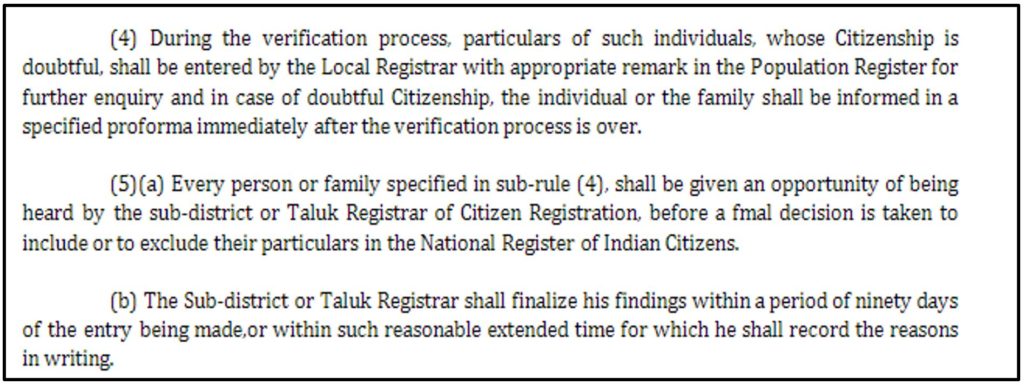D-Voter or a Doubtful voter is a term that was often discussed in the context of the NPR & NRC exercise. But who is a D-Voter and what does this mean? Here is a detailed explainer.
Following the outbreak of COVID-19 pandemic that has gripped the world, the government of India postponed the first phase of Census 2021 and NPR updation until further orders. The first phase of Census was originally scheduled to take place between April and September, this year.
The NPR exercise has been opposed as it is considered as being a prelude to the preparation of National Register of Citizens (NRC) throughout the country. The Citizenship Amendment Act, 2019 combined with NPR and NRC has been criticized by many as an attempt by the BJP led government to exclude Muslims from NRC, as a result of which protests erupted in different parts of the country opposing CAA, NRC, and NPR.
The debate around NPR continued to take place in the parliament during the budget session that commenced on 31 January 2020 and continued till 23 March 2020. The second session was curtailed because of COVID-19.
Home Minister stated in Rajya Sabha that no documents need to be furnished for NPR
During a heated debate on NPR exercise in the Rajya Sabha on 12 March 2020, the Home Minister, Amit Shah stated that no documents will be required for NPR. Further, he also stated that no one will be declared a ‘D-Voter’ even if they fail to produce papers. One can give whatever information they have and leave the other questions blank. But, what does D- Voter mean? Who falls under this category? These questions and more, are discussed in this story.

Who is a D- Voter?
D- voter is the acronym used for ‘doubtful voter’. Those persons whose citizenship was doubtful or was under dispute were categorized as ‘D- Voters’ during the preparation of National Register of Citizens in Assam.
However, ‘doubtful voter’ or ‘doubtful citizenship’ have not been defined in the Citizenship Act, 1955 or the Citizenship Rules of 2003. The Citizenship Rules, 2003 was framed under the provisions of Citizenship (Amendment) Act, 2003. The rules framed in 2003 list out the steps to be followed for the preparation of National Population Register (NPR) and the National Register of Indian Citizens (NRIC). Under sub section 4 of section 4 that deals with the preparation of NRIC, it has been only mentioned that details of individuals whose citizenship is doubtful will be entered by Local Registrar with ‘appropriate remark in the population register for further enquiry’.
Once a family or an individual is marked as doubtful citizen (D-Category), they are then informed in a specified pro forma as soon as the verification process comes to an end. They are also given a chance to be heard by Sub- district or Taluk Registrar of Citizen Registration before arriving at a final decision on whether their name will be included in the register. The Registrar has time of 90 days to finalize his findings and justify it.

Cases are referred to foreign tribunals for confirmation
The Electoral Registration Officer (ERO) considers the verification report. If the Registration Officer feels that the person is not an Indian citizen, then the case is referred to Superintendent of Police who refers it to the Foreigners Tribunal for its opinion. The Foreigner tribunals are setup under the Foreigners (Tribunals) Order, 1964. Based on the tribunal’s decision, the Officer must add or delete the names of doubtful citizens.
However, there is no mention on what grounds an individual will be considered a doubtful citizen. It can also be seen that the entire responsibility to carry out the task is that of local officers. Possibility of misuse of power by these officers cannot be ruled out. Foreigners Tribunals are quasi-judicial bodies which give their opinion on whether a person is a foreign individual as per the provisions of Foreigners Act, 1946 and Illegal Migrants (Determination by Tribunal) Act, 1983. The IMDT Act was struck down by the Supreme Court in 2005 as the act and its rules were violation of Article 355 of the Constitution which bestows the Union to protect states against external aggression and internal disturbances. The act was also considered the biggest hurdle for identifying and deporting illegal migrants in Assam by the apex court.

What happened in Assam?
Classifying individuals as doubtful voters took place in Assam during the revision of electoral rolls in 1997 by the Election Commission of India. As many as 3.13 Lakh persons were marked doubtful in the draft voters list. Later, in the electoral rolls, they were marked as doubtful voters even after local verification. As of October 2019, as per a Lok Sabha answer, there were around 1.13 Lakh people marked as D-Voters in Assam, of which more than 70,000 were females. Currently, there are 100 Foreigners Tribunals in Assam that deal with cases under Foreigners Act and that of D- voters. These Foreigners Tribunals are comprised of judges and advocates.
A total of 4.68 lakh cases were referred to Foreigners Tribunals in Assam was as of October 2019. More than 1.14 Lakh persons were declared as Indian citizens by these tribunals. A further 1.29 Lakh individuals were declared foreigners by the tribunals. No child was declared a foreigner. A total of 4 Bangladesh nationals and 2 Afghan nationals were deported as of December 2019.
What happens if one is categorized as a doubtful voter?
Doubtful voters are not eligible to cast their vote in elections as their Indian citizenship is not confirmed. They are also barred from contesting elections in the country. The marking as doubtful voter is a temporary measure and cannot be prolonged. A decision in a definite period of time must be taken. If the person is found to be an illegal migrant or a foreigner, they are sent to detention camps and deported depending on the documents presented. There are six detention centres in Assam with a capacity to hold more than 3300 persons.
D- Voters also have the option to apply and get their names included in NRC. They will be included only after they get clearance from the Foreigners Tribunals and their names are removed from electoral rolls under the ‘D’ category.

States put on hold NPR exercise because of additional controversial questions in the NPR form, as per reports
Reports suggest that states such as West Bengal and Kerala had put their NPR exercise on hold. This was because of the addition of controversial questions in the NPR form. Some questions included as per reports are place of last residence, mother tongue, Aadhar number, date and place of birth of father and mother, mobile number, Indian passport, and Voter’s ID. NPR updation exercise was planned to be conducted along with the exercise for the 2021 Census.
Featured Image: D-Voter


